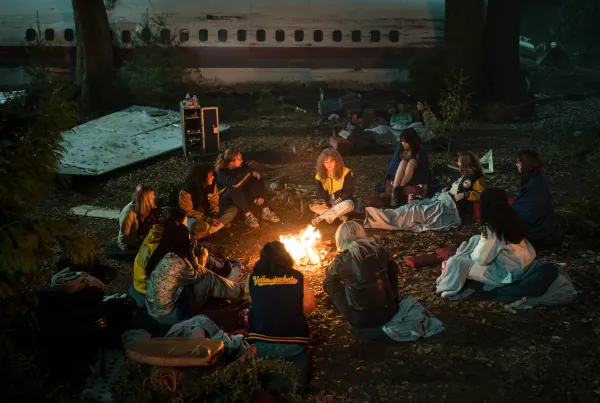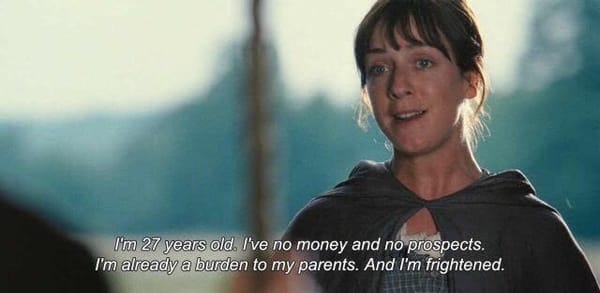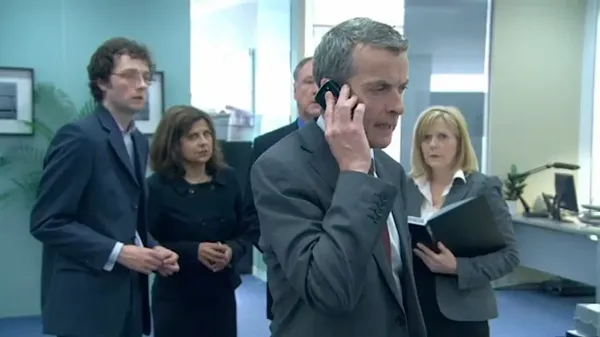Scriptnotes Recap: Episode 685, Page and Stage with Leslye Headland
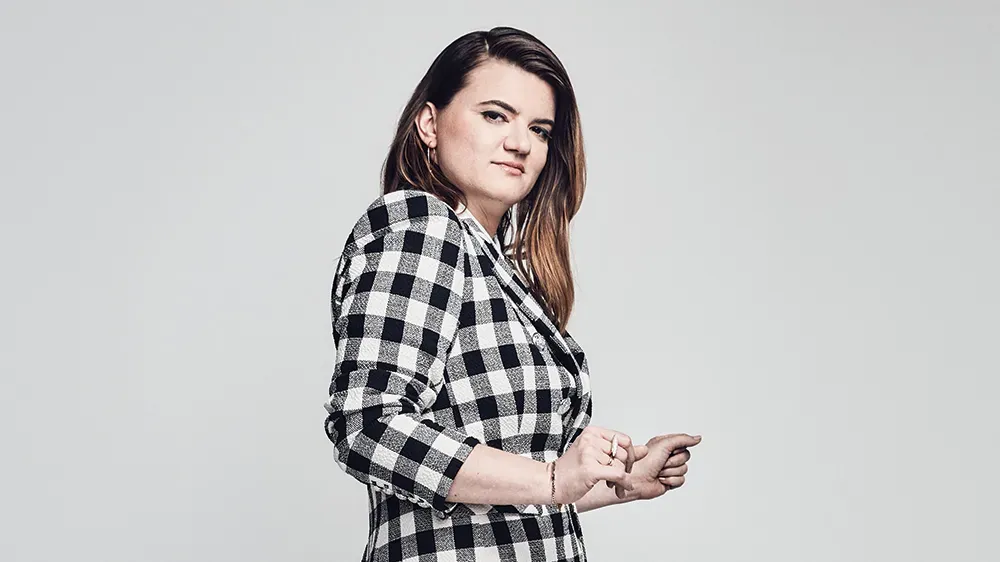
Leslye Headland was a theater kid. She is now, of course, one of the most prolific and productive storytellers around, seemingly always writing and directing plays, movies and TV shows all at the same time. But when we sat down with her to focus on her most recent play Cult of Love (which of course she’s turning into a movie too, that girl don’t quit), the biggest revelation to me was through her origin story as a big ol' theater nerd.
It makes sense, as many screenwriters grew up in the theater. But you can feel how her theatrical roots influences her work ethic, characters, dialogue, and her relationship with the audience. As someone who planed their childhood around when the next musical audition would be, I recognized a lot of myself in Leslye's story, and was so inspired to hear from someone who made similar choices and carved a brilliant path for themselves. Naturally I think there's a lot to learn from her origin story, and wanted to highlight some of it here:
Starting out as a Writer
Leslye: I was one of those kids that just started writing. I would read books that I’d get from the library, like Judy Blume, or American Girl doll books, which I absolutely loved. I would fill composition books with rip-offs of those. Just doing exactly the same structure, beat for beat imitations, but with my own characters, with themes and personalities that I found more interesting than the simplistic morality of those types of books.
But very soon I found musical theater. I became completely obsessed with Stephen Sondheim. Nobody could tell me anything that wasn’t Stephen Sondheim. I was introduced to him from the D. A. Pennebaker documentary about the recording of Company. My dad was watching it late at night and he said, “Leslye, get in here.” I ran into my parents’ room and started watching it. Sondheim is wearing all black and there’s one part where he puts his head in his hands, he’s so depressed at what’s happening. I said, “Who is that?” My Dad responded, “That’s the writer.” Suddenly, that was my basis for what a writer was.
Developing a Style
Leslye: I went to Tisch for college for directing. I would write screenplays on my own that were terrible. I would give them to my friends. They would say, “This is terrible,” but I learned so much from directing. Just figuring out how to tell a story visually rather than texturally was exactly what I needed.
As a senior, you do a full length play. I did Waiting for Godot because I love that play. It is my heart. It is exactly who I am. Sondheim and Godot were my major influences.
People at Tisch responded to the production, essentially, the same way that people respond to my work now, which is, they’re impressed, but they’re also confused by what’s happening. My mentor for Gadot said, “I think you’re one of the darkest people I’ve ever met, but also really stupid things make you laugh.” The style of what I do now absolutely was born out of that production.
Work Out the Kinks Early
Leslye: I started the Seven Deadly Plays series because I wanted to challenge myself to write seven plays. That was really the biggest thing, was, “Can I keep writing, and can I keep getting better, and stop thinking about one particular project as being the thing that’s going to make me?” I think sometimes when we are in a fishbowl of writing drafts or writing first drafts, it’s almost like your brain is a dangerous neighborhood and you really shouldn’t be hanging out there alone.
I would say very close to the first draft, I will do a reading with actors. I make sure there's nothing really wonky in that draft. What’s fun about that is that because all of my friends are actors who will preform this script, it makes me take the draft more seriously. Anything that I feel would be stupid or embarrassing, I’ll take that out, and it forces me to be a little bit better at my job.
Actors also have good feedback. If they’re trusted people, they won’t be like, “I just don’t get it.” They’ll say, “I really loved this part. I didn’t really understand this scene. Is it supposed to be this or that?” Which can lead you to some very interesting questions much earlier in the writing process. Plus, you get the real time feedback of whether your scene is actually interesting, or is just terrible.
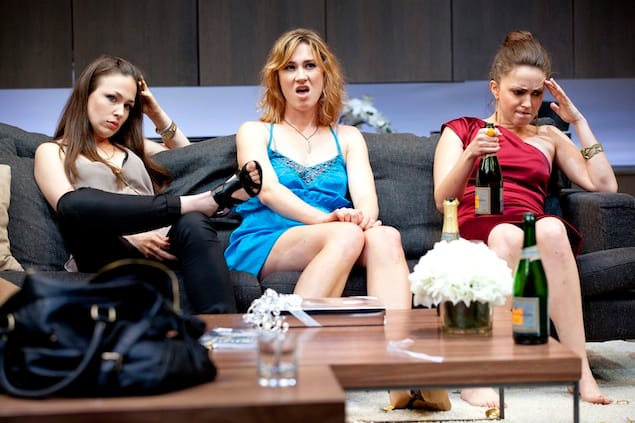
Finding Her Way to the Director’s Chair
Leslye: As a writer, I thought I was going to sell my work. I did not assume that I was going to be directing it. I worked really hard on the screenplay for Bachelorette. I got an agent based on it. I started to do the Water Bottle Tour where your agent sends you out to the executives at different production companies. Over and over again, I got the feedback about the movie that, “This is absolutely the way women talk, but no one wants to watch that.” I thought it would be a good writing sample, and maybe I can get some jobs off of it, but that it was finished as a screenplay.
Adam McKay, Will Ferrell, and Jessica Elbaum ended up optioning it just as the play was going up in New York. They sent it to a bunch of directors, which is par for the course. We sent it to every human. Everybody passed. I was at the Gary Sanchez Christmas party with Adam and a bunch of other people. I was just sitting there with Adam chatting, and he said, “We haven’t found a director for Bachelorette.” I said, “I think we’ll find somebody.” He said, “Why don’t you just direct it?” I said, “I think that’s a great idea. I think I should.”
Again, just do everything before you’re ready. If you get that opportunity, do not think in your head, “I don’t know how to do that.” Just say yes. Just say, “Absolutely.”

Center Your Work on Character
Leslye: In Russian Doll we started with the character. We did not start with, “Here’s how we’re going to circle the time-loop drain.” It had to be somebody who was struggling with her own mortality, but in a way where she’s not talking about it.
I wanted to write a show about a woman that was going through an existential problem rather than a tactile problem, like, “Who do I marry? What job do I take? Oh, I’m being chased by this guy. I’ve got to solve the case.” It just felt like there weren’t female protagonists truly based in, “I’m having an existential crisis about my own mortality and whether or not the choices that I have made up until this moment are adding up to anything worthwhile.”
Then we had to figure out how to externalize that problem, which really came from my work on the Seven Deadly Plays. How do you externalize and physicalize envy? That’s a thing that happens in your mind. How do you put it into an active space? The circling of the drain for Nadia, which, in addition to being Groundhog Day, each loop gives you evidence of things disappearing.
It’s not just, I’m going through the same day. It’s, I’m dying continually, and each time I die something is taken away from me. We did plan out some logistics, like animals go at this time, fruits, vegetables, and flowers go at this time. Other people start disappearing here. But that premise is the shell of the real story. It was like a medicine that you’re trying to get somebody to take. If you put it in a gel cap, it’s easier to take down. We don’t want the audience to be asking what’s going on. We want the audience asking, “How are they going to get out of this?”
Listen to the full episode here or anywhere you get your podcasts.
For our entire catalog of conversations like this, sign up to become a premium member at Scriptnotes.net

